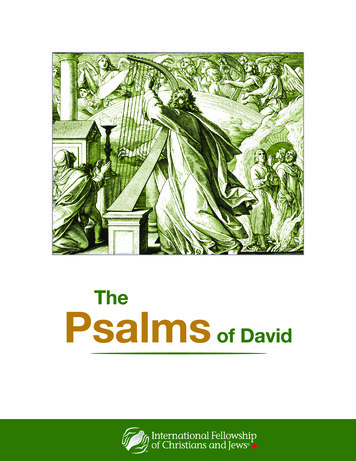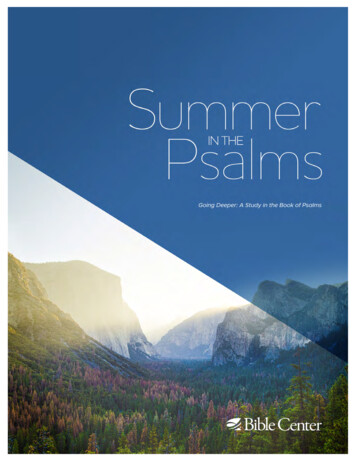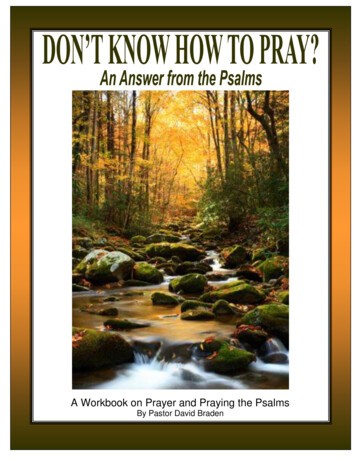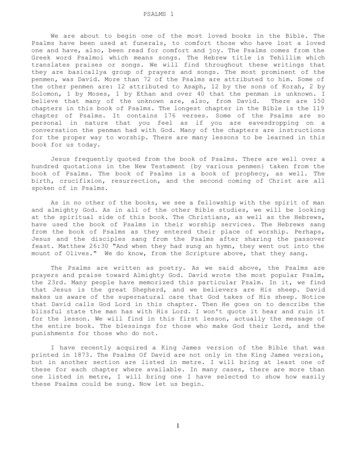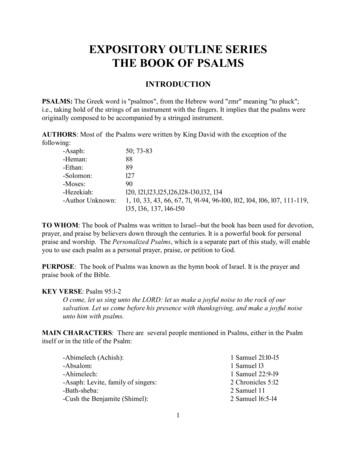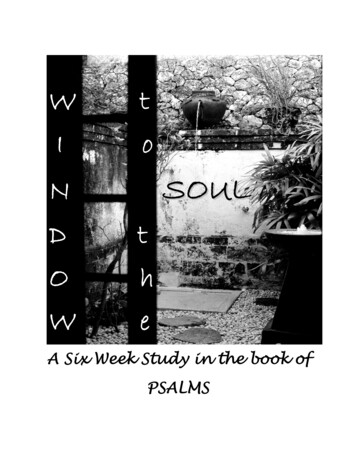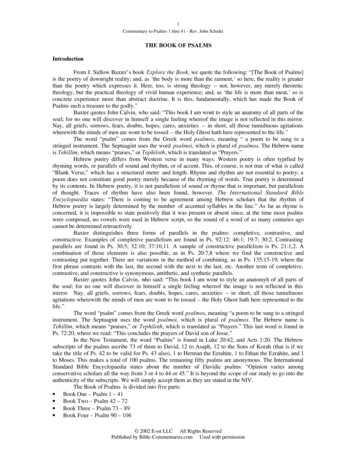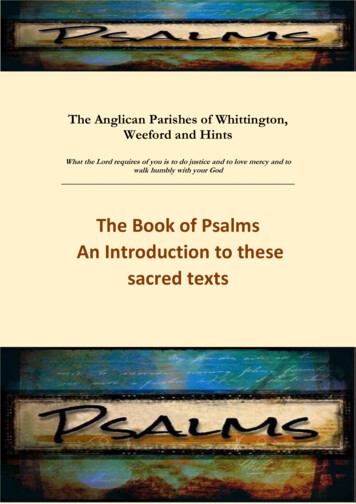
Transcription
The Anglican Parishes of Whittington,Weeford and HintsWhat the Lord requires of you is to do justice and to love mercy and towalk humbly with your GodThe Book of PsalmsAn Introduction to thesesacred texts1
2
IntroductionThe Book of Psalms is parthymn book, part prayer book,part wisdom literature, andpart anthology of poemsconcerning Israel and God. Itssubject matter isastonishingly broad.On one hand it proclaimspraise and prayer for GodMost High (Psalms 50:14),and on the other, it embraceshuman experience asintimate as lamenting a lost mother (Ps. 35:14).Psalms is distinctive in the First Testament inthat most of it consists of people talking to God.Elsewhere, the First Testament is mostly Godtalking to people or it is narrative.Although thousands of years old, virtually all thepsalms, in one way or another, mirror our ownstruggles and our joys today. Whatever aparticular psalm’s subject may be, each gives3
voice to the emotions we feel as we grapple withlife’s issues. Some psalms capture our delight inGod as we experience the divine presence withus through a tough situation that has had a goodending.Others express raw emotions of anger or grief ina struggle to understand why God has not actedas we thought he would when “the wickedtriumph.” In some, God speaks. In others God issilent. Some find resolution, while others leaveus with unanswered questions.The psalms were not all written by one person atone timeThe Psalms are so important in the Christiantradition that they form the daily prayer cycle ofmany monastic communities such as theBenedictines. For Anglicans they form the basisof our cycle of prayer morning, noon, eveningand night.4
The entire collection ofPsalms is entitled“Praises” in the Hebrewtext. Later, rabbis oftendesignated it “The Book ofPraises.” The Greektranslation of the FirstTestament labelled it“Psalms.”The Greek verb fromwhich the noun “psalms”comes basically denotes the “plucking ortwanging of strings,” so that an association withmusical accompaniment is implied. The Englishtitle derives from the Greek term and itsbackground. The Psalms constituted Israel’sancient, God-breathed (2 Tim. 3:16) “hymnbook,” which defined the proper spirit andcontent of worship.There are 116 psalms that have superscriptionsor “titles.” The Hebrew text includes these titleswith the verses themselves. When the titles aresurveyed individually and studied, there aresignificant indications that they were appended5
to their respective psalms shortly aftercomposition and that they contain reliableinformation (Luke 20:42).These titles conveyvarious kinds ofinformation such asauthorship,dedication, historicaloccasion, liturgicalassignment to aworship director,liturgical instructions(e.g., what kind ofsong it is, whether itis to have a musical accompaniment, and whattune to use), plus other technical instructions ofuncertain meaning due to their great antiquity.6
Authorship and DateFrom the divine perspective, the Psalter (Book ofPsalms) points to God as its author.Approaching authorship from the human side,one can identify a collection of more than 7composers.King David wrote at least 75 of the 150 psalms;the sons of Korah accounted for 10 (Pss. 42, 44–49,84, 85, 87); and Asaph contributed 12 (Pss.50, 73–83). Other penmen included Solomon(Pss. 72, 127), Moses (Ps. 90), Heman (Ps. 88),and Ethan (Ps. 89).The remaining 48 psalms remain anonymous intheir authorship, although Ezra is thought to bethe author of some. The time range of thePsalms extends from Moses, ca. 1410 B.C. (Ps.90), to the late sixth or early fifth century B.C.post-Exilic period (Ps. 126), which spans about900 years of Jewish history.7
Background and SettingThe backdrop for the Psalms is twofold:1) the acts of God in creation and history,2) the history of Israel.Historically, the psalms rangein time from the origin of lifeto the post-Exilic joys of theJews liberated from Babylon.Thematically, the psalmscover a wide spectrum oftopics, ranging from heavenlyworship to earthly war. Thecollected psalms comprise thelargest book in the Bible andthe most frequently quotedFirst Testament book in theSecond Testament.Psalm 117 represents the middle chapter (out of1,189) in the Bible. Psalm 119 is the largestchapter in the entire Bible. Through the ages, thepsalms have retained their original primarypurpose, i.e., to engender the proper praise andworship of God.8
Historical and Theological ThemesThe basic theme of Psalmsis living real life in the realworld, where twodimensions operatesimultaneously:Without denying the painof the earthly dimension,the people of God are tolive joyfully anddependently on thePerson and promisesstanding behind theheavenly/eternaldimension.All cycles of human troubles and triumphsprovide occasions for expressing humancomplaints, confidence, prayers, or praise, to oursovereign Lord.In view of this, Psalms presents a broad array oftheology, practically couched in day-today9
reality. The sinfulness of man is documentedconcretely, not only through the behaviouralpatterns of the wicked, but also by the periodicstumblings of believers. The sovereignty of Godis everywhere recognized, but not at theexpense of genuine human responsibility.Life often seems to be out of control, and yet allevents and situations are understood in the lightof divine providence as being right on courseaccording to God’s timetable.Assuring glimpses of a future” God’s day”bolsters the call for perseverance to the end.This book of praise manifests a very practicaltheology.A commonly misunderstood phenomenon inPsalms is the association that often developsbetween the “one” (the psalmist) and the“many” (the theocratic people). Virtually all ofthe cases of this occur in the psalms of KingDavid. There was an inseparable relationshipbetween the mediatorial ruler and his people; aslife went for the king, so it went for the people.Furthermore, at times this union accounted for10
the psalmist’s apparentconnection with Christin the messianic psalms(or messianic portionsof certain psalms). Theso-called imprecatory(curse pronouncing)psalms may be betterunderstood with thisperspective.As God’s mediatorialrepresentative onearth, David prayed forjudgment on hisenemies, since theseenemies were not onlyhurting him, but wereprimarily hurting God’speople. Ultimately,they challenged theKing of Kings, the Godof Israel.11
Interpretive Challenges12
It is helpful to recognize certain recurring genresor literary types in the Psalter. Some of the mostobvious are:1) the wisdom type with instructions for rightliving;2) lamentation patterns which deal with thepangs of life (usually arising from enemieswithout);3) penitential psalms (mostly dealing with the“enemy” within, i.e., sin);4) kingship emphases (universal or mediatorial;theocratic and/or messianic rule);5) thanksgiving psalms. combination of style andsubject matter help to identify such types whenthey appear.The comprehensive literary characteristic of thepsalms is that all of them are poetry parexcellence. Unlike most English poetry, which isbased on rhyme and meter, Hebrew poetry is13
essentially characterized by logical parallelisms.Some of the most important kinds of parallelismsare:1) synonymous (the thought of the first line isrestated with similar concepts in the second line,e.g., Ps. 2:1);2) antithetic (the thought of the second line iscontrasted with the first, e.g., Ps. 1:6);3) climactic (the second and any subsequentlines pick up a crucial word, phrase, or conceptand advance it in a stair-step fashion, e.g., Ps.29:1, 2);4) chiastic or introverted (the logical units aredeveloped in an A B B’ A’ pattern, e.g.,Ps. 1:2).On a larger scale, some psalms in theirdevelopment from the first to the last verseemploy an acrostic or alphabetical arrangement.Psalms 9, 10, 25, 34, 37, 111, 112, 119, and 145are recognized as either complete or incompleteacrostics.14
In the Hebrew text, the first letter of the firstword of every verse begins with a differentHebrew consonant, which advances inalphabetical order until the 22 consonants areexhausted. Such a literary vehicle undoubtedlyaided in the memorization of the content andserved to indicate that its particular subjectmatter had been covered from “A to Z.” Psalm119 stands out as the most complete example ofthis device, since the first letter of each of its 22,8-verse stanzas moves completely through theHebrew alphabet.15
OutlineThe 150 canonical psalms were organized quiteearly into 5 “books.” Each of these books endswith a short hymn of praise before peopledeparted the congregation. These are known asa doxology (Pss. 41:13; 72:18–20; 89:52; 106:48;150:6).Jewish traditionappealed to thenumber 5 andalleged that thesedivisions echoedthe Pentateuch,i.e., the 5 books ofMoses.16
It is true that there are clusters of psalms, suchas1) those drawn together by an association withan individual or group (e.g., “The sons of Korah,”Pss. 42–49; Asaph, Pss. 73–83),2) those dedicated to a particular function (e.g.,“Songs of ascents,” Pss. 120–134),3) those devoted explicitly to praise worship(Pss. 146–150).But no one configuration key unlocks the“mystery” as to the organizing theme of this 5book arrangement. Thus, there is no identifiablethematic structure to the entire collection ofpsalms.17
Psalm 139You have searched me, Lord,and you know me.2You know when I sit and when I rise;you perceive my thoughts from afar.3You discern my going out and my lying down;you are familiar with all my ways.4Before a word is on my tongueyou, Lord, know it completely.5You hem me in behind and before,and you lay your hand upon me.6Such knowledge is too wonderful for me,too lofty for me to attain.7Where can I go from your Spirit?Where can I flee from your presence?8If I go up to the heavens, you are there;if I make my bed in the depths, you are there.9If I rise on the wings of the dawn,if I settle on the far side of the sea,10even there your hand will guide me,your right hand will hold me fast.11If I say, “Surely the darkness will hide meand the light become night around me,”12even the darkness will not be dark to you;18
the night will shine like the day,for darkness is as light to you.13For you created my inmost being;you knit me together in my mother’s womb.14I praise you because I am fearfully andwonderfully made;your works are wonderful,I know that full well.15My frame was not hidden from youwhen I was made in the secret place,when I was woven together in the depths ofthe earth.16Your eyes saw my unformed body;all the days ordained for me were written inyour bookbefore one of them came to be.17How precious to me are your thoughts,[a] God!How vast is the sum of them!18Were I to count them,they would outnumber the grains of sand—when I awake, I am still with you. 19 If only you,God, would slay the wicked!Away from me, you who are bloodthirsty!20They speak of you with evil intent;your adversaries misuse your name.19
21Do I not hate those who hate you, Lord,and abhor those who are in rebellion againstyou?22I have nothing but hatred for them;I count them my enemies.23Search me, God, and know my heart;test me and know my anxious thoughts.24See if there is any offensive way in me,and lead me in the way everlasting. Source for this booklet Copyright 2007, Grace to You. www.gty.org All rights reserved. Used bypermission. 2014 by the Theology of Work Project, Inc. used by permission.Images used under fairuse clause for study purposes only. Text and images remain intellectual property oforiginator20
“Psalms.” The Greek verb from which the noun “psalms” comes basically denotes the “plucking or twanging of strings,” so that an association with musical accompaniment is implied. The English title derives from the Greek term and its background. The Psalms const
